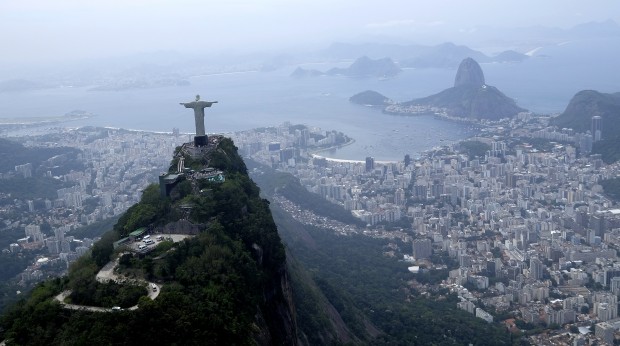Failure to sell Olympic seats is Brazil’s big ticket headache

In this Oct. 9, 2015, file photo, the Christ the Redeemer statue is shown in this aerial view of Rio de Janeiro, Brazil. AP FILE
RIO DE JANEIRO, Brazil — Brazil’s government sounded the alarm Saturday over meager sales of Olympic tickets and public apathy just five months before Rio hosts South America’s first Summer Games.
With worries about the Zika virus, high crime and a major political crisis already overshadowing the August 5 opening ceremony, Brazil now faces the embarrassing prospect of empty stadiums.
Article continues after this advertisementREAD: Suarez, Ladon nail Rio Olympic spots | Pacquiao would love to fight for Philippines at Rio Olympics
Only 50 percent of tickets to the Olympics have sold so far, Rio 2016 organizing committee spokesman Phil Wilkinson told AFP on Saturday. For the Paralympics, which follow the main Games, the figure is far worse: just 12 percent.
Ricardo Leyser, who this week replaced George Hilton as Brazil’s minister of sport, said in an interview with Folha newspaper that he was working on a plan to boost purchases — as well as to stir up more excitement among Brazilians.
Article continues after this advertisementOne measure could be the government buying unsold tickets, particularly for the Paralympics, and distributing them among schools, he said.
“There is a perception that the Brazilian population has not yet woken up for the Games. We are going to work energetically on this because it’s still not in people’s heads. We need to sound an alert so that people remember this event and go and buy tickets,” he said.
Multiple challenges
The Olympics were awarded to Rio de Janeiro in 2009 when Brazil was politically stable and enjoying a prolonged spurt of economic growth. But with the final 100 days mark fast approaching, organizers find themselves tackling serious problems on almost every front imaginable.
President Dilma Rousseff faces impeachment, meaning the country does not even know who will be its leader by the time the Games start.
And a bruising recession has forced deep cuts to the Olympic budget, with everything from security to the opening ceremony and even facilities for athletes in the Olympic Village having to make do with less.
A national outbreak of Zika, a mosquito-transmitted virus that is believed to potentially cause serious birth defects if contracted by pregnant women, has sparked numerous travel warnings.
Another worry, highlighted by the abrupt resignation last week of national public security chief Adilson Moreira, is safety.
Brazil is one of the world’s most violent countries and chunks of Rio — including the huge Mare slum, located near both the airport and the stadium hosting the opening ceremony — are subject to frequent shootouts between drug gangs and police.
Leyser called security preparations “critical,” especially in the wake of Islamist gun and bomb attacks on crowded targets in Paris and Brussels.
More than 85,000 police, soldiers and other personnel are being deployed in Rio for the two weeks of the Games.
That’s twice as many as were needed for the London 2012 Summer Games. However, critics have queried Brazil’s ability to deal with the unfamiliar challenge of terrorism.
In his resignation, Moreira was quoted by Brazilian media as saying he was “ashamed” of what he called Rousseff’s “unscrupulous” government.
But last Thursday, the Brazilian tourist authorities issued an appeal to industry operators around the world to be reassured that the Games would take place in “security and tranquility.”
Impeachment, corruption
Just as Rousseff fights to survive impeachment, Brazil is being engulfed in a corruption scandal that has revealed massive embezzlement by a Who’s Who of the country’s political and business elite.
The scheme combining embezzlement and systematic bribery was centered on state oil company Petrobras, though rippling out to a multitude of other businesses, during the presidency of Rousseff’s predecessor and main ally, Luiz Inacio Lula da Silva. He himself is fighting criminal charges.
Leyser told Folha that he and his ministry were focused on the job of getting the Olympics ready and would not be distracted by the political battles in the capital Brasilia.
“The ministry is extremely busy with day to day activities. We have to complete works — we don’t have time to think about impeachment,” he said. “The ministry is working and ready.”
But questions have been raised about Olympic construction contracts, which in a significant number of cases — notably the giant firm Odebrecht — were awarded to companies linked to the Petrobras scheme. On Thursday, a group of Rio de Janeiro councilors filed a request for an inquiry, Globo newspaper reported.